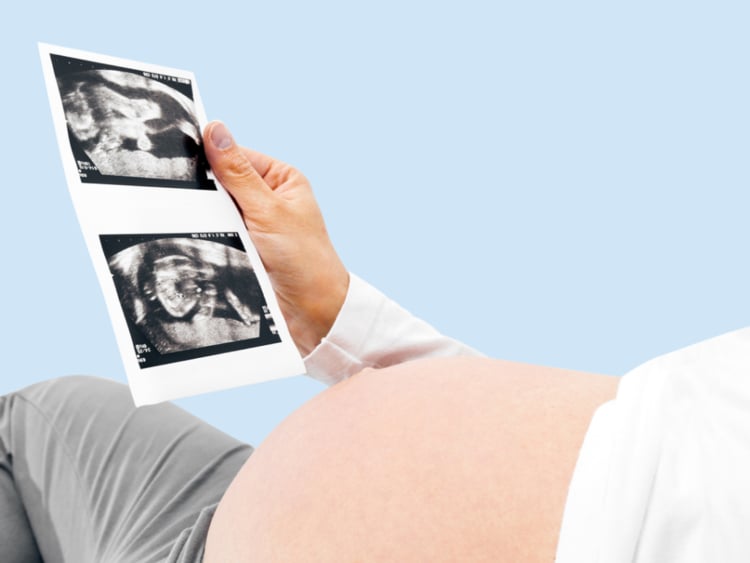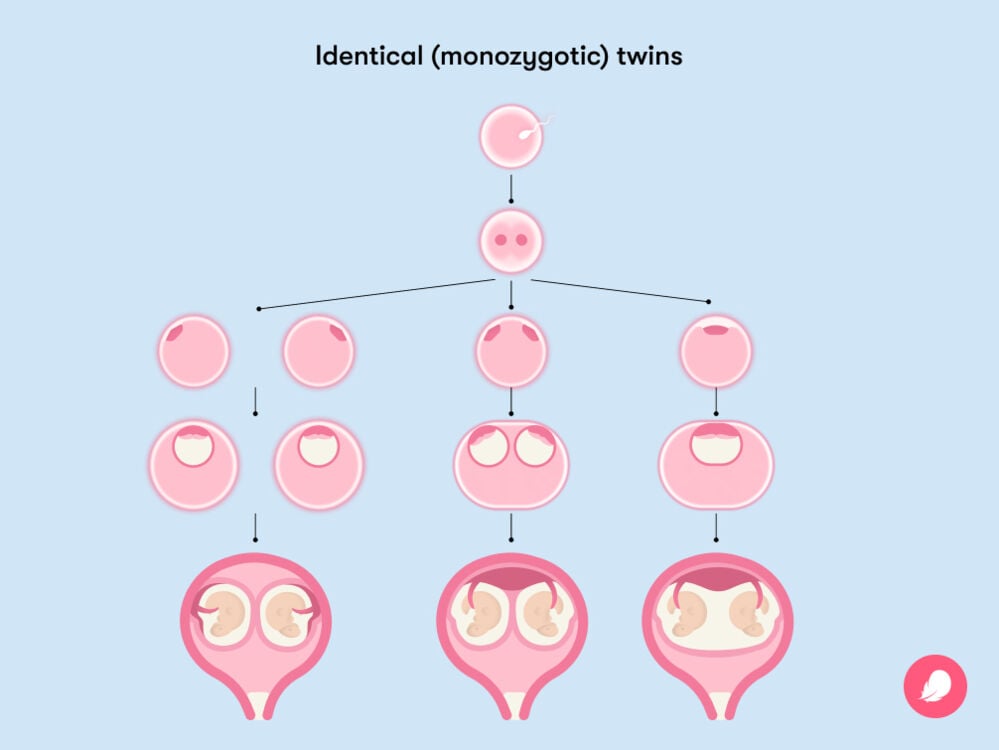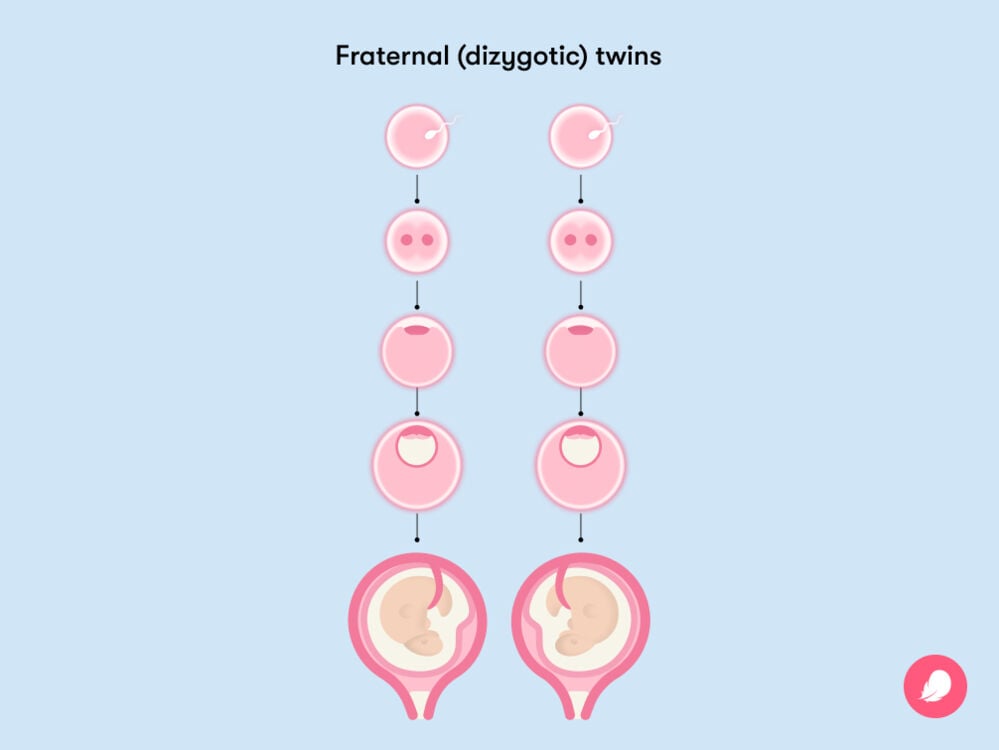There are lots of myths surrounding how to get pregnant with twins and what might increase your odds. Here’s the lowdown on twin conception.
-
Tracking cycle
-
Getting pregnant
-
Pregnancy
-
Help Center
-
Flo for Partners
-
Anonymous Mode
-
Flo app reviews
-
Flo Premium New
-
Secret Chats New
-
Symptom Checker New
-
Your cycle
-
Health 360°
-
Getting pregnant
-
Pregnancy
-
Being a mom
-
LGBTQ+
-
Quizzes
-
Ovulation calculator
-
hCG calculator
-
Pregnancy test calculator
-
Menstrual cycle calculator
-
Period calculator
-
Implantation calculator
-
Pregnancy weeks to months calculator
-
Pregnancy due date calculator
-
IVF and FET due date calculator
-
Due date calculator by ultrasound
-
Medical Affairs
-
Science & Research
-
Pass It On Project New
-
Privacy Portal
-
Press Center
-
Flo Accuracy
-
Careers
-
Contact Us
How to get pregnant with twins: Myths surrounding twin conception


Every piece of content at Flo Health adheres to the highest editorial standards for language, style, and medical accuracy. To learn what we do to deliver the best health and lifestyle insights to you, check out our content review principles.
Key takeaways
- The thought of having twins might fill you with excitement or fear. However, if twins don’t run in your family, then it’s unlikely that you’ll have them — but not impossible.
- Fraternal (nonidentical) twins are a lot more common than identical twins and other types of multiple pregnancies.
- Studies have suggested that factors like your ethnicity and weight may affect the chances of conceiving twins.
- Like so much of pregnancy, there are also a lot of myths surrounding twin conception, including that your diet, breastfeeding, and male fertility could impact your chances of having twins.
What are the odds of having twins?
There aren’t any medically proven ways to intentionally get pregnant with twins. However, whether you’re pregnant or not, you may have found yourself wondering what your chances of having twins are in the future. Twin pregnancies are still fairly rare, with twin births only making up about 3% of all births in the United States. However, it absolutely isn’t impossible.
Having twins is more common than it was in the past. Over the last 40 years, the number of twin births has increased by a third. Experts believe this might be partially related to the fact that more people are having babies later in life, and fertility treatments have advanced so much over the last few decades.
How twin conception happens
If you want to understand your chances of getting pregnant with twins, knowing how they’re conceived is important.
There are two different types of twins.
Identical twins
Identical twins occur when one egg is fertilized by one sperm. The egg then splits into two separate embryos. Identical twins might share a placenta and an amniotic sac, share a placenta and each have separate amniotic sacs, or have two separate placentas and an amniotic sac each. Genetically, the two babies are identical and are always the same sex. Genetics doesn’t determine how likely you are to have identical twins, and they don’t run in families.

Take a quiz
Find out what you can do with our Health Assistant
Nonidentical twins
Nonidentical, or fraternal, twins occur when two separate eggs are fertilized by two different sperm. Nonidentical twins have their own placenta and their own unique genetics. Fraternal twins are a lot more common than identical twins.

Factors that can increase your chances of getting pregnant with twins
As mentioned above, there aren’t any medically proven ways to intentionally get pregnant with twins, but there are some factors that might make it more likely for you to have a twin pregnancy.
Family history
If one of your parents is a twin or even if you’re a twin, there’s no guarantee that you’ll go on to get pregnant with multiples. However, there’s a greater chance of having fraternal twins if the person carrying the pregnancy has them in their family. If your mother had twins, then there could be a greater chance that you could have twins, too. This doesn’t apply if your male partner's family has a lot of twins, and the notion that twins usually “skip a generation” is a myth.
Undergoing fertility treatment and assisted reproductive technology
Fertility treatment and assisted reproductive technologies (ART) are some of the most significant factors in twin births. Fertility medication can stimulate egg production and increase the likelihood of releasing multiple eggs during ovulation, which could result in a twin pregnancy.
Similarly, sometimes during ART like in vitro fertilization (IVF), when eggs and sperm are combined in a lab and then transferred to the uterus, the chances of having a twin pregnancy are higher. In some cases, more than one embryo may be transferred, which can lead to the possibility of having twins. However, guidelines encourage a single embryo transfer in order to minimize the risk of twin pregnancy.
Identical twins
While it’s uncommon, you may have a higher chance of conceiving identical twins if you’re undergoing ART. When a single embryo is transferred, the rate of identical twins is between 1% and 3%.
Fraternal twins
Fraternal twins are more common with fertility treatments. This is because treatments can stimulate your ovaries to release two or more eggs during ovulation, which can lead to the fertilization of two or more eggs in one cycle. Another reason is that your health care provider may implant two or more fertilized eggs in your uterus during IVF, which can also result in twins.
Triplets and quadruplets
Just as ART slightly increases your chances of having a twin birth, fertility treatments can contribute to many triplets and quadruplets, known as higher-order multiple births. According to a study, about a third of twin births and three-fourths of triplet, quadruplet, and other higher-number multiple births are attributed to fertility treatments.
Ethnicity
Ethnicity is another factor that can influence the chances of carrying twins. In the United States, Black women are most likely to give birth to twins. Asian and Native American people are the least likely to become pregnant with two or more kids at a time, and white women are the most likely to give birth to higher-order multiples (triplets or more).
Age
Age can play a role in having twins, too. Recent studies have found that women who are over the age of 35 have a higher chance of becoming pregnant with multiples. This is possibly because, after age 35, you produce more follicle-stimulating hormone (FSH), which can trigger your ovaries to release more than one egg per month more often.
Myths about your chances of getting pregnant with twins
While there’s no medically proven way to increase your chances of having twins, there are lots of myths about the tips, tricks, and factors that can increase your odds. Let’s bust them once and for all.
Male fertility
The twins gene runs down the female bloodline, but some have suggested that male fertility could impact the chances of having twins. A small study examined how sperm health might be linked to having twins. No direct link has been drawn between sperm quality and twin births.
Body composition
Some researchers believe that your body composition could make you more or less predisposed to conceive twins. Research has suggested that obesity could lead to more twin pregnancies. However, health care providers don’t recommend gaining weight to increase your chances of having twins.
Hormonal birth control
There are lots of myths that surround the hormonal contraceptive pill and fertility. One is that stopping the pill can overstimulate your ovaries and lead to hyper-ovulation, which means releasing more than one egg at a time. This might be due to a sudden increase in FSH, which is essential for ovulation. However, this isn’t proven at all. Most studies suggest that this effect is only temporary, and the research is really conflicting.
Supplements
If you’re planning to get pregnant, your doctor might recommend taking a supplement, such as the B vitamin folic acid. Folic acid has been shown to benefit fetal development and prevent neural tube defects, but can taking folic acid help you conceive twins? Some small studies have looked into the impact of supplements on twin pregnancies, but there isn’t enough evidence to say for sure.
Diet
One myth is that what you eat might impact your chances of having twins. Unsurprisingly, research into this is really inconclusive, and there isn’t a lot of evidence to support this theory.
Breastfeeding
Similarly, one study suggested that women who were breastfeeding and got pregnant were more likely to conceive twins, but there hasn’t been any additional research to back this up. You may even notice that your period doesn’t return while you’re breastfeeding, as in some cases it can prevent you from ovulating.
Are there any risks involved in having twins?
Having twins can be incredibly exciting. Your baby will be born with a friend for life. However, there are some serious risks associated with twin pregnancies. Multiple pregnancies (twins, triplets, or more) carry double the risk of hypertension (when the pressure in your blood vessels is too high.) Nausea and vomiting is a common pregnancy symptom, and there’s an increased chance of this in twin pregnancies. In some severe cases, this can lead to hyperemesis gravidarum, a severe form of pregnancy nausea and vomiting.
There are some serious pregnancy complications linked with carrying twins or multiples, including:
- Preterm birth (when your baby is born before 37 weeks)
- Gestational hypertension (high blood pressure in pregnancy)
- Anemia (lower red blood cell count)
- Gestational diabetes
- Preeclampsia
You’re also more likely to deliver your twins early. Full-term pregnancy is considered a pregnancy lasting between 39 weeks and 40 weeks and six days and early term is defined as delivering between 37 weeks and 38 weeks six days. You may naturally go into labor earlier with twins, or your doctor may recommend that you deliver before your due date to prevent complications. Like anything with pregnancy, this can differ from person to person. Your healthcare provider is always on hand to support you so speak to them if you have any questions or concerns about your pregnancy.
FAQs
Who carries the gene for twins?
As mentioned above, if the person carrying the pregnancy has fraternal (nonidentical) twins in their family, then they may have an increased chance of having nonidentical twins.
Can you have twins if it doesn’t run in your family?
Yes, you can have twins even if they don’t run in your family. That’s because the likelihood of having twins is multifactorial, which means several things can influence it. Although you’re more likely to have fraternal twins if they run in your family, that’s not true for identical twins.
How many months is a twin pregnancy?
Being pregnant with twins doesn’t mean you’ll be pregnant for longer. In fact, it could mean a shorter pregnancy. The average twin pregnancy lasts 36 weeks (just over 8 months) compared to 40 weeks. However, this isn’t the same for everyone, and if you’re having a twin pregnancy and are curious about when you will deliver, the best thing to do is speak to your health care provider.
Is twin delivery more painful?
If both you and your babies are healthy, the delivery process is similar to that of a single baby. Your health care provider should outline the different forms of birth and pain management available to you, and you can discuss this with them when you’re putting together your birth plan. There is an increased chance that you may have a caesarian section if you’re carrying multiple babies.


Hey, I'm Anique
I started using Flo app to track my period and ovulation because we wanted to have a baby.


The Flo app helped me learn about my body and spot ovulation signs during our conception journey.


I vividly
remember the day
that we switched
Flo into
Pregnancy Mode — it was
such a special
moment.
Real stories, real results
Learn how the Flo app became an amazing cheerleader for us on our conception journey.
References
Adashi, Eli Y., and Roee Gutman. “Delayed Childbearing as a Growing, Previously Unrecognized Contributor to the National Plural Birth Excess.” Obstetrics and Gynecology, vol. 132, no. 4, Oct. 2018, pp. 999–1006, https://doi.org/10.1097/aog.0000000000002853.
“ART and Multiple Births.” Centers for Disease Control and Prevention, www.cdc.gov/art/key-findings/multiple-births.html. Accessed 30 Aug. 2023.
Castracane, V. D., et al. “When Is It Safe to Switch from Oral Contraceptives to Hormonal Replacement Therapy?” Contraception, vol. 52, no. 6, Dec. 1995, pp. 371–76, https://doi.org/10.1016/0010-7824(95)00229-4.
“Folic Acid.” Centers for Disease Control and Prevention, www.cdc.gov/ncbddd/folicacid/about.html. Accessed 30 Aug. 2023.
Chao, S. “The Effect of Lactation on Ovulation and Fertility.” Clinics in Perinatology, vol. 14, no. 1, Mar. 1987, pp. 39–50, https://doi.org/10.1016/S0095-5108(18)30780-2.
“Complications of Multiple Pregnancy.” Johns Hopkins Medicine, www.hopkinsmedicine.org/health/conditions-and-diseases/staying-healthy-during-pregnancy/complications-of-multiple-pregnancy. Accessed 30 Aug. 2023.
“Definition of Term Pregnancy.” The American College of Obstetricians and Gynecologists, Nov. 2013, www.acog.org/clinical/clinical-guidance/committee-opinion/articles/2013/11/definition-of-term-pregnancy.
Dyer, Owen. “Women May Ovulate Two or Three Times a Month.” BMJ, vol. 327, no. 7407, July 2003, p. 124.
“Overview of Multiple Pregnancy.” University of Rochester Medical Center, www.urmc.rochester.edu/encyclopedia/content.aspx?contenttypeid=85&contentid=P08019. Accessed 30 Aug. 2023.
Gandhi, Manisha, et al. “Impact of Changes in Maternal Body Composition on Birth Weight and Neonatal Fat Mass in Dichorionic Twin Pregnancies.” The American Journal of Clinical Nutrition, vol. 108, no. 4, Oct. 2018, pp. 716–21, https://doi.org/10.1093/ajcn/nqy180.
“Gestational Diabetes.” NHS, www.nhs.uk/conditions/gestational-diabetes/. Accessed 30 Aug. 2023.
“Giving Birth to Multiple Babies.” Tommy’s, www.tommys.org/pregnancy-information/giving-birth/giving-birth-multiple-babies. Accessed 30 Aug. 2023.
Hoekstra, Chantal, et al. “Dizygotic Twinning.” Human Reproduction Update, vol. 14, no. 1, Jan.–Feb. 2008, pp. 37–47, https://doi.org/10.1093/humupd/dmm036.
“In Vitro Fertilization (IVF).” Mayo Clinic, 10 Sep. 2021, www.mayoclinic.org/tests-procedures/in-vitro-fertilization/about/pac-20384716.
“Is the Probability of Having Twins Determined by Genetics?” MedlinePlus, medlineplus.gov/genetics/understanding/traits/twins/. Accessed 30 Aug. 2023.
“IVF.” NHS, www.nhs.uk/conditions/ivf/risks/. Accessed 30 Aug. 2023.
Kanter, Jessica R., et al. “Trends and Correlates of Monozygotic Twinning after Single Embryo Transfer.” Obstetrics and Gynecology, vol. 125, no. 1, Jan. 2015, pp. 111–17, https://doi.org/10.1097/aog.0000000000000579.
Kulkarni, Aniket D., et al. “Fertility Treatments and Multiple Births in the United States.” The New England Journal of Medicine, vol. 369, no. 23, Dec. 2013, pp. 2218–25, https://doi.org/10.1056/nejmoa1301467.
Lambalk, C. B., et al. “Increased Levels and Pulsatility of Follicle-Stimulating Hormone in Mothers of Hereditary Dizygotic Twins.” The Journal of Clinical Endocrinology and Metabolism, vol. 83, no. 2, Feb. 1998, pp. 481–86, https://doi.org/10.1210/jcem.83.2.4552.
Lee, Noel M., and Sumona Saha. “Nausea and Vomiting of Pregnancy.” Gastroenterology Clinics of North America, vol. 40, no. 2, June 2011, pp. 309–34, https://doi.org/10.1016/j.gtc.2011.03.009.
“Morning Sickness: Nausea and Vomiting of Pregnancy.” The American College of Obstetricians and Gynecologists, May 2020, www.acog.org/womens-health/faqs/morning-sickness-nausea-and-vomiting-of-pregnancy.
“Multiple Pregnancy and Single Embryo Transfer.” The Newcastle Upon Tyne Hospitals NHS Foundation Trust, 8 Nov. 2022, www.newcastle-hospitals.nhs.uk/services/fertility-treatment/ivf-and-icsi-information-for-patients-having-treatment/multiple-pregnancy-and-single-embryo-transfer/.
“Nutrition during Pregnancy.” The American College of Obstetricians and Gynecologists, June 2023, www.acog.org/womens-health/faqs/nutrition-during-pregnancy.
“Overview of Multiple Pregnancy.” Stanford Medicine Children’s Health, www.stanfordchildrens.org/en/topic/default?id=overview-of-multiple-pregnancy-85-P08019. Accessed 30 Aug. 2023.
“Ovulation Induction.” UCSF Health, www.ucsfhealth.org/education/ovulation-induction. Accessed 30 Aug. 2023.
“Perinatal Risks Associated with Assisted Reproductive Technology.” The American College of Obstetricians and Gynecologists, Sep. 2016, www.acog.org/clinical/clinical-guidance/committee-opinion/articles/2016/09/perinatal-risks-associated-with-assisted-reproductive-technology.
“Preeclampsia.” Mayo Clinic, 15 Apr. 2022, www.mayoclinic.org/diseases-conditions/preeclampsia/symptoms-causes/syc-20355745.
Segal, Nancy L. “Do Males Affect Twinning Events? A Review of Current Findings/Twin Research Reviews: Monozygotic Twins Discordant for Parkinson’s Disease; Fetal Loss in Twin Pregnancies Following Prenatal Diagnosis; Uterine Rupture and Repair in an Early Twin Pregnancy; Twin Study of Affectionate Communication/Human Interest: Conjoined Twins in a Triplet Set; Identical Twin Nurses Deliver Identical Twins; Identical Twins Discordant for COVID-19 Recovery Course; Identical Twins Pass Away from COVID-19; Archeological Finds of Oldest Identical Twins.” Twin Research and Human Genetics, vol. 24, no. 2, Apr. 2021, pp. 140–44, https://doi.org/10.1017/thg.2021.8.
Steinman, G. “Mechanisms of Twinning. IV. Sex Preference and Lactation.” The Journal of Reproductive Medicine, vol. 46, no. 11, Nov. 2001, pp. 1003–07.
“Twin Peaks: Record International Number of Twin Births.” University of Oxford, 12 Mar. 2021, www.ox.ac.uk/news/2021-03-12-twin-peaks-record-international-number-twin-births.
“Twin Pregnancy.” Cleveland Clinic, my.clevelandclinic.org/health/articles/23158-twin-pregnancy. Accessed 30 Aug. 2023.
“Twin Pregnancy: Answers from an Expert.” Johns Hopkins Medicine, www.hopkinsmedicine.org/health/conditions-and-diseases/staying-healthy-during-pregnancy/twin-pregnancy-answers-from-maternal-fetal-medicine-specialist. Accessed 30 Aug. 2023.
“Pregnancy: Types of Delivery.” Cleveland Clinic, my.clevelandclinic.org/health/articles/9675-pregnancy-types-of-delivery. Accessed 30 Aug. 2023.
“Understanding Twins.” Psychology Today, www.psychologytoday.com/gb/basics/twins. Accessed 30 Aug. 2023.
“Antenatal Care with Twins.” NHS, www.nhs.uk/pregnancy/your-pregnancy-care/antenatal-care-with-twins/. Accessed 30 Aug. 2023.
“Giving Birth to Twins or More.” NHS, www.nhs.uk/pregnancy/labour-and-birth/what-happens/giving-birth-to-twins-or-more/. Accessed 30 Aug. 2023.
“Pregnant with Twins.” NHS, www.nhs.uk/pregnancy/finding-out/pregnant-with-twins/. Accessed 30 Aug. 2023.
History of updates
Current version (16 October 2023)
Published (22 November 2018)
In this article

Get your personal guide to fertility
-
Learn how to read your body's ovulation signals
-
Find daily conception tips from our experts
-
Chat with others who are trying to get pregnant




